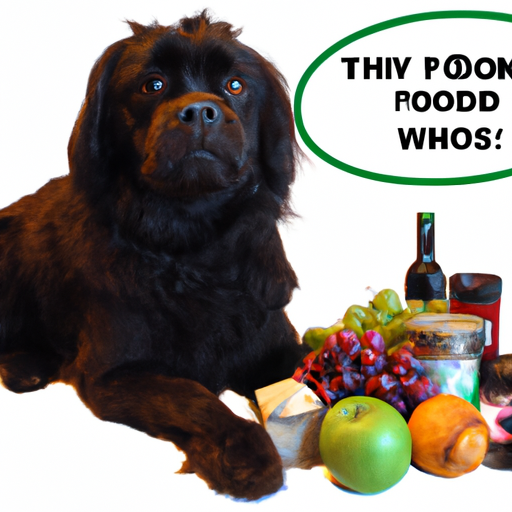As a caregiver to your beloved pet, it’s crucial to know what foods are safe for your dogs and which ones are not. In this guide, we’ll dive into eight types of foods that are potentially harmful to your furry friend.
1. Chocolate
Chocolate is one of the most well-known foods that are harmful to dogs.
-
Why is it harmful?
Chocolate contains theobromine, a stimulant dogs can’t efficiently metabolize. -
What are the potential effects?
Symptoms can range from diarrhea, vomiting to more severe conditions such as seizures, and in extreme cases, death.
| Type of Chocolate | Theobromine per Ounce |
|---|---|
| Milk Chocolate | 64 milligrams |
| Dark Chocolate | 150 milligrams |
| Baking Chocolate | 450 milligrams |
2. Grapes and Raisins
Grapes and raisins might seem like harmless treats, but they can be deadly for dogs.
- Why is it harmful?
The toxicity of grapes and raisins is not fully understood, but even small amounts can cause kidney failure in dogs.
3. Onions and Garlic
Onions, garlic, and other members of the allium family are poisonous to dogs.
- Why is it harmful?
These foods can cause damage to a dog’s red blood cells, leading to anemia.
4. Avocado
While avocados are healthy for humans, they’re not so much for dogs.
- Why is it harmful?
Avocados contain a toxin called persin, which can cause vomiting and diarrhea in dogs.
5. Alcohol
Alcohol is another toxic substance for dogs and should be kept well out of their reach.
- Why is it harmful?
Ingestion can cause significant drops in a dog’s blood pressure, body temperature, and blood sugar, which can lead to seizures and respiratory failure.
6. Coffee and Caffeine
Caffeine is also dangerous to dogs and can produce similar effects as chocolate.
- Why is it harmful?
Caffeine is a stimulant that dogs can’t efficiently metabolize, leading to symptoms like restlessness, rapid breathing, and heart palpitations.
7. Xylitol
Xylitol is a sugar substitute found in many sugar-free products and is highly toxic to dogs.
- Why is it harmful?
Xylitol can cause a rapid release of insulin in dogs, leading to hypoglycemia (low blood sugar).
8. Dairy Products
Dairy products can cause digestive problems in dogs as they lack the enzyme to break down lactose.
- Why is it harmful?
Consumption of dairy products can cause diarrhea, vomiting, and other digestive problems in dogs.
FAQs
1. What should I do if my dog consumes a harmful food?
If your dog consumes a harmful food, contact your vet immediately. They may need to induce vomiting or provide other treatments.
2. How can I prevent my dog from eating bad food?
The best prevention is to keep harmful foods well out of your dog’s reach. Also, make sure everyone in your household is aware of the harmful foods.
3. Can dogs eat any human food?
Some human foods are safe for dogs, such as peanut butter, carrots, and cooked chicken. However, always check if a food is safe before giving it to your dog.
4. Is chocolate always bad for dogs, regardless of the amount?
Generally, yes. While a smaller dog may become seriously ill from a small amount of chocolate, a larger dog may not. However, it’s best to avoid giving any chocolate to your dog.
5. Are there any signs to look out for if my dog has ingested harmful food?
Watch for symptoms such as vomiting, diarrhea, seizures, lethargy, and changes in appetite or behavior. If you notice any of these signs, contact your vet immediately.
Remember, it’s always better to be safe than sorry when it comes to your dog’s diet. Always check with your vet if you’re unsure about anything. After all, you’re the primary caregiver to your furry friend, and their health depends on you.



